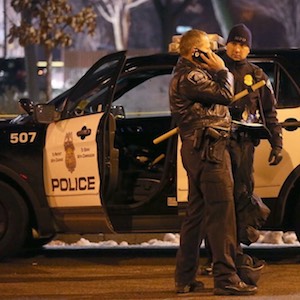IMPORTANT NOTE: Please check out the EXPANDED, revised edition of our report; the older version is still available below.
~~~
Enough is Enough! That is both the conclusion and the title of this report, a 150-year performance review of the Minneapolis Police Department (MPD). The report is the product of an investigation into the conduct of the department over the fifteen decades since its founding in 1867. It includes a survey of its current role and impact, especially on marginalized communities, and an exploration of viable alternatives to the policing model. With this report, we hope to take the idea of police-free communities out of the realm of fantasy and place it firmly in the public agenda as a practical necessity. You can download a PDF copy of the report, listen to the the whole report as an audio book, or read the following sections online.
Where We’ve Been

The first section will establish that the MPD has always acted as the enforcement arm of the economic and political elite. Like its fellow departments around the country, it is at the front end of a system of mass incarceration that devours black, brown and indigenous peoples, stripping them of voting rights, job prospects and dignity, keeping wages low and people divided. The US police system, we contend, is not reformable. Efforts to reform it – aimed at addressing recruitment, training, discipline, oversight and transparency — are quickly and effectively neutralized by the organized opposition of police departments and their unions and professional associations.
Where We’re At

Part two speaks of the present. It features interviews by MPD150’s interview team and by partner organizations. We share the reflections of professionals (in areas such as mental health, domestic and sexual violence, emergency response, and homelessness) whose work is impacted by the police. They report that the militarized, combative presence of police is not the medicine needed in our traumatized communities. Even the social service functions absorbed into the police system over the years would be better-served by removing them from department control. We also hear from community members who contend with police intervention in their daily lives. The constant reality of intimidation, harassment and bullying are the wide base of the police misconduct iceberg of which murder by police is just the tip.
Where We’re Going

In the third section, we turn to face the future. What might it look like if we addressed our communities’ needs as neighbors and creative problem solvers instead of relying on force and imprisonment? Here we draw on the insights from our interviews, the promise of existing alternatives, and examples from other places to begin sketching the outlines of the police-free communities of the future. We have no shortage of ancient cultural traditions, innovative social programs, and community resilience strategies from which to draw.
The transition to a resilience-based Minneapolis will not come overnight. It will require a succession of steps that starts with limiting the harm caused daily by police power, and begins the orderly transfer of resources from the police to projects, programs, and grassroots initiatives that meet people’s emergency and long-term needs. Neighborhoods with good jobs, affordable homes, healthy food, and green places to play produce less conflict and fewer mental health crises than ones that feature empty lots, under-funded schools, and starvation wages. Like any process of change, the transitional period will raise new questions and pose new problems. It will, naturally, meet with concerted resistance. The solutions that result, however, will be designed to help all our communities thrive, not contain and divide them.
The material presented here turns the common wisdom on its head. The idea of a police-free future is neither naive nor unrealistic. It is the only pragmatic solution to the challenge of a police system rooted in the era of slavery and Indian removal which has defeated every reform effort thrown at it. To believe that we are just one or two reforms away from turning the police into a trusted partner of the very communities it has treated like enemies to be conquered for a century and a half… that is the ultimate in magical thinking!
It is time for Minneapolis to look this problem in the face and begin a new, more courageous, conversation about our future, a conversation that includes possibilities that the police, media pundits, and corporate lobbyists tell us are out of bounds. This report is a contribution to that discussion.
You can read the whole report in PDF format, or take it piece by piece on our website. We’ve broken out the three main parts of the print report into the Past, Present, and Future categories. In addition to the print materials, you can find a Timeline of MPDs history, and some Alternatives to calling the police both now and in the future.